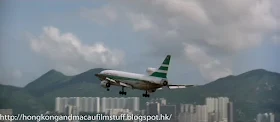Actually, there are two separate scenes, the top one I guess is supposed to be Clouseau's plane landing and then later the second close up scene as Herbert Lom's character, Dreyfus, also arrives. The hazy mountain scenery in the background of the lower shot surprises me because I figured haze such as that was only a modern characteristic of Hong Kong's currently over-polluted nature. I guess more things are at play than I realised.
General
▼
Bruce Lee self-guided Tours (work in progress)
▼
Wednesday, September 2, 2015
Revenge of the Pink Panther - Peter Sellers (1978) - Kai Tak Airport, Kowloon
Peter Sellers and Burt Kwouk in top form pursuing gangsters across the globe and arriving in Hong Kong to some - still - highly recognisable locations starting with the required 'plane landing at Kai Tak Airport sequence' to establish our locale.
Actually, there are two separate scenes, the top one I guess is supposed to be Clouseau's plane landing and then later the second close up scene as Herbert Lom's character, Dreyfus, also arrives. The hazy mountain scenery in the background of the lower shot surprises me because I figured haze such as that was only a modern characteristic of Hong Kong's currently over-polluted nature. I guess more things are at play than I realised.
Actually, there are two separate scenes, the top one I guess is supposed to be Clouseau's plane landing and then later the second close up scene as Herbert Lom's character, Dreyfus, also arrives. The hazy mountain scenery in the background of the lower shot surprises me because I figured haze such as that was only a modern characteristic of Hong Kong's currently over-polluted nature. I guess more things are at play than I realised.






2 comments:
You knew I'd be here sooner or later with the plane trivia, didn't you? ;-)
The aircraft in these screenshots is, obviously, a Cathay Pacific Lockheed L-1011 TriStar. (Or as Cathay branded it at the time, a "Super TriStar". That wasn't an official name, though, and I don't think any other airlines called it the Super TriStar.)
Cathay had a lot of these -- no less than 19 different airframes -- and through the 1980s and 90s were the largest non-US operator of the type. The reason why they had so many is rather interesting.
Both Lockheed's TriStar and Douglas' DC-10 were created thanks to demand from American Airlines for a long-range jet that was smaller than the 747. American eventually ended up opting for the DC-10 instead of the TriStar, but Lockheed still launched the latter on the back of orders from TWA and Eastern Air Lines, and went on to build around 250 of them.
Cathay bought a couple direct from Lockheed in 1975, about three years after the type first entered service with Eastern, and over the next two years, went on to buy three more -- two direct from Lockheed, and one from Eastern. (But the second pair from Lockheed weren't new: They'd first been leased to Court Line, a British charter airline that had promptly gone bankrupt just a year after getting its first wide-bodies.)
But why did Eastern sell one of its TriStars to Cathay, so soon after buying the plane itself? Well, from the mid-1970s, Eastern found itself in increasing financial difficulties in part due to its large TriStar order, coupled with the 1970s energy crisis, US airline deregulation, and a highly-paid, unionized workforce that was crippling it. Its response was to start selling or leasing its own fleet.
Over the next 15 years through to Eastern's eventual bankruptcy, Cathay bought about nine more of Eastern's TriStars directly, and three more via third-parties. Four of these were purchased through 1980, but it wasn't until 1987-1989 that the bulk of the fleet arrived. CX also leased or bought a couple more from Air Canada, via Air Lanka.
Cathay's last TriStar was bought from Eastern in 1990, and in 1995, it started selling them off again. They'd all been retired from the CX fleet by 1997, and all of them have since been scrapped, I believe. (There's a vague question-mark over one plane that may have escaped the scrap yard, but I rather doubt it.)
After scrapping, fuselage parts from one of the ex-Cathay TriStars were used as the aircraft interior for scenes in the James Bond film "Die Another Day". The closest thing remaining to a Cathay TriStar can be found in Daegu, South Korea, where the remnants of the fuselage of VR-HOI still exist as what was once a restaurant, and is now a coffee shop.
And which of those 19 planes is in this movie? Well, Cathay didn't even take ownership of 13 of them until after the film hit theatres, so we can rule those out. That only leaves six possibilities: The four purchased direct from Lockheed, or the first two of the 13 ex-Eastern planes. Those are VR-HHK and VR-HHL (the pair bought new in 1975), VR-HHG (the first Eastern purchase in 1976), VR-HHV and VR-HHW (the ex-Court Line leased bodies that Cathay bought in 1977), and VR-HHX (Cathay's second Eastern purchase in mid-1977.)
Sadly, I can't quite make out the number -- it's on the tail, and the last three letters of the registration will also be on the nose gear doors. More likely than not, though, it's one of the very rare few that Cathay obtained direct from Lockheed...
Oh, and note the usual smattering of HATS vehicles in the last two screenshots. ;-)
an absolute stellar job there. I recognised the tristar - I used to have a model one as a youngster - but that's about all. Sadly these are the only screen caps I have so I don't think a reg number will be forthcoming - the top pic is the closest the camera gets to the tail.
Post a Comment